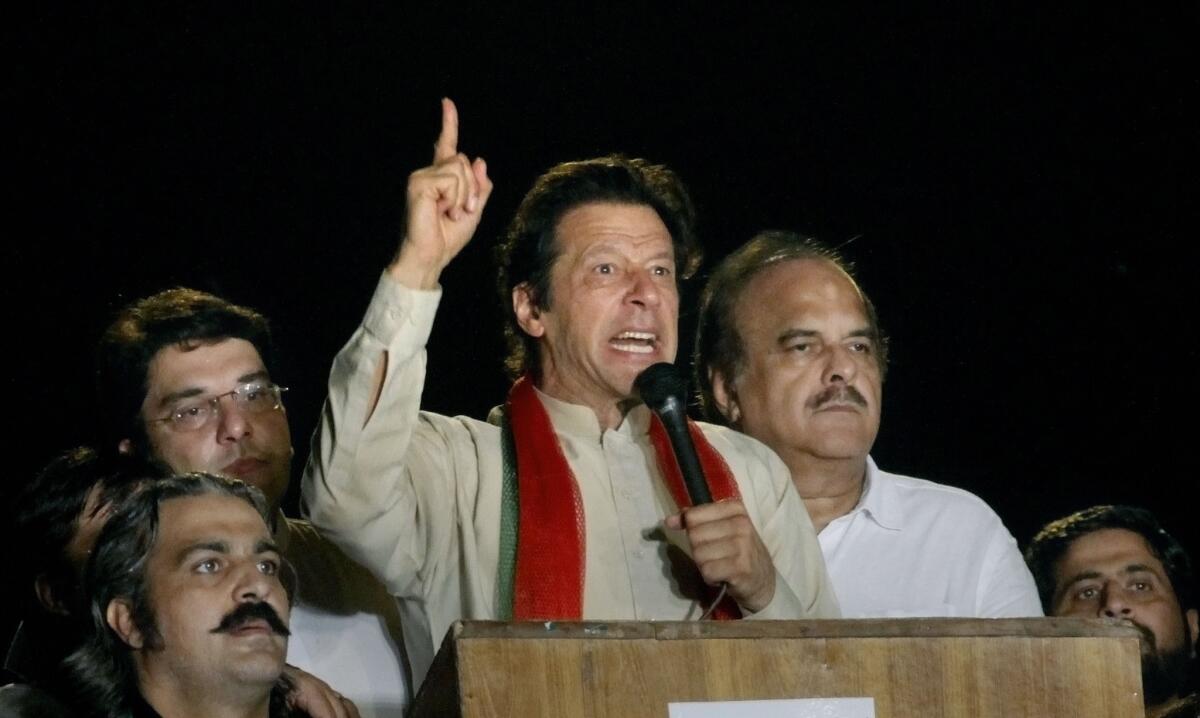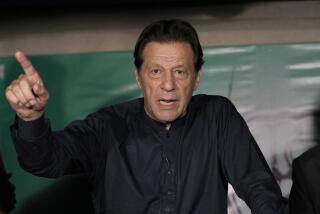Imran Khan’s party quits parliament in Pakistan election protest

Reporting from Islamabad, Pakistan — A leading opposition party resigned from Pakistan’s parliament on Monday in protest against election results last year that handed a sweeping victory to Prime Minister Nawaz Sharif.
The move by opposition leader Imran Khan, a former cricket hero, was aimed at forcing Sharif to leave office over alleged vote rigging, which the Pakistani leader has denied.
It came after several days of protests in which Khan led thousands of supporters from the city of Lahore to the capital, Islamabad. Many slept outdoors and faced heavy rains on the first two days of a sit-in in Islamabad.
Khan called his supporters to start a nationwide civil disobedience campaign and to stop paying utility bills and taxes to the government.
Sharif’s government, whose May 2013 election victory set in motion the first peaceful, democratic transfer of power in a country plagued by coups, dismissed the calls for him to resign.
“We are ready to talk to them, but it cannot happen that a mob of 10,000 or 15,000 comes to the capital and demands the resignation of the PM,” said Pervaiz Rashid, Pakistan’s information minister.
Khan’s Pakistan Tehreek-e-Insaf party has 34 members in the 342-seat lower house of parliament. Leaders said they would also resign from three out of four provincial assemblies in Pakistan.
The fourth province, Khyber Pakhtunkhwa, is controlled by Khan’s party, and officials there will keep their posts. The province is a notorious hotbed of violence by Islamic militants and criminal gangs.
A second protest march led by populist cleric Tahirul Qadri has also called on Sharif to resign and has brought thousands more supporters into the streets of Islamabad. The Pakistani government deployed 40,000 security officers and barred the demonstrators from entering the capital’s so-called red zone, which houses key government buildings.
Analysts said the move by Khan could plunge an already unstable Pakistan -- which is battling an economic crisis and waging a military offensive against Islamist extremists in its tribal areas -- into deeper political paralysis.
Sharif’s government has formed committees to hold talks with Khan and Qadri and earlier this month announced a judicial commission to investigate some of the vote-rigging allegations. But analysts said that further concessions could be necessary to appease the protesters.
“Imran Khan has taken the situation to a level … that the government would have to come up with some serious suggestions to avoid a crisis in the country,” said Khawar Ghumman, a senior political journalist in Islamabad. But Khan’s call for resignations was probably a bargaining chip, he added.
“I do not think the PM would resign,” Ghumman said. “Both parties would have to come to some middle ground.”
Sahi is a special correspondent.
More to Read
Sign up for Essential California
The most important California stories and recommendations in your inbox every morning.
You may occasionally receive promotional content from the Los Angeles Times.










